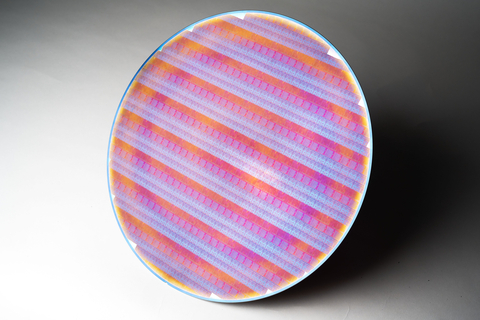PowerVia Test Shows Industry-Leading Performance
Intel is first to implement backside power in a product-like chip, resulting in over

A wafer holds Blue Sky Creek test chips. The production test helps Intel refine Intel’s PowerVia backside power technology. Expected as part of the Intel 20A manufacturing node in 2024, PowerVia will be the industry’s first implementation of backside power in silicon, solving decades of interconnect bottlenecks. (Credit: Intel Corporation)
“PowerVia is a major milestone in our aggressive ‘five nodes in four years’ strategy and on our path to achieving a trillion transistors in a package in 2030. Using a trial process node and subsequent test chip enabled us to de-risk backside power for our leading process nodes, placing Intel a node ahead of competitors in bringing backside power delivery to market.”
–Ben Sell, Intel vice president of Technology Development
How It Works: Intel decoupled development of PowerVia from transistor development to ensure its readiness for silicon implementation based on Intel 20A and Intel 18A process nodes. PowerVia was tested on its own internal test node to debug and ensure good functionality of the technology before its integration with RibbonFET in Intel 20A. After fabrication and testing on a silicon test chip, PowerVia was confirmed to bring a remarkably efficient use of chip resources with greater than
Intel will present these findings in two papers at the VLSI Symposium on June 11-16 in
Why It Matters: PowerVia is well ahead of competitors’ backside power solutions, giving chip designers – including Intel Foundry Services (IFS) customers – a faster path to valuable energy and performance gains in their products. Intel has a long track record of introducing the industry’s most critical new technologies, such as strained silicon, Hi-K metal gate and FinFET, to propel Moore’s Law forward. With PowerVia and RibbonFET gate-all-around technology coming in 2024, Intel continues to lead the industry in chip design and process innovations.
PowerVia is the first to solve the growing interconnect bottleneck issue for chip designers. Surging use cases, including artificial intelligence and graphics, require smaller, denser and more powerful transistors to meet ever-growing computing demands. Today and for the past many decades, power and signal lines within a transistor’s architecture have competed for the same resources. By separating the two, chips can increase performance and energy-efficiency, and deliver better results for customers. Backside power delivery is vital to transistor scaling, enabling chip designers to increase transistor density without sacrificing resources to deliver more power and performance than ever.
How We are Doing It: Intel 20A and Intel 18A will introduce both PowerVia backside power technology and RibbonFET gate-all-around technology. As a completely new way of delivering power to the transistors, backside power implementation raised new challenges for thermals and debugging designs.
By decoupling development of PowerVia from RibbonFET, Intel could work through those challenges quickly to ensure readiness for implementation in silicon based on Intel’s 20A and 18A process nodes. Intel engineers developed mitigation techniques to prevent the thermals from becoming an issue. The debug community also developed new techniques to ensure the new design structure could be appropriately de-bugged. As a result, the test implementation delivered solid yield and reliability metrics while demonstrating the intrinsic value proposition of the technology well before it joins new RibbonFET architecture.
The test also leveraged design rules enabled by EUV (extreme ultraviolet) lithography, which produced results including standard cell utilization of more than
What's Next: In a third paper to be presented during VLSI, Intel technologist Mauro Kobrinsky will explain Intel's research into more advanced methods to deploy PowerVia, such as enabling both signaling and power delivery on either the front or the back side of the wafer.
Bringing PowerVia to customers ahead of the industry and continuing to innovate into the future is in keeping with Intel’s long history of being first to bring new semiconductor innovations to market while constantly innovating.
More Context: With PowerVia, Intel Achieves a Chipmaking Breakthrough
About Intel
Intel (Nasdaq: INTC) is an industry leader, creating world-changing technology that enables global progress and enriches lives. Inspired by Moore’s Law, we continuously work to advance the design and manufacturing of semiconductors to help address our customers’ greatest challenges. By embedding intelligence in the cloud, network, edge and every kind of computing device, we unleash the potential of data to transform business and society for the better. To learn more about Intel’s innovations, go to newsroom.intel.com and intel.com.
© Intel Corporation. Intel, the Intel logo and other Intel marks are trademarks of Intel Corporation or its subsidiaries. Other names and brands may be claimed as the property of others.
View source version on businesswire.com: https://www.businesswire.com/news/home/20230605005191/en/
Robin Holt
1-503-616-1532
robin.holt@intel.com
Source: Intel Corporation







